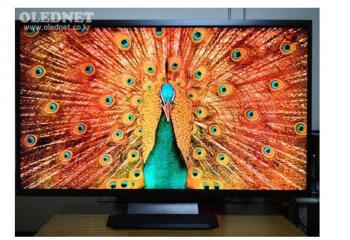AUO's president Paul Peng says that large-size OLED panel will not challenge LCD panels in the next few years due to low yields and high costs. In fact, he says that OLED TVs may end up like SED and FED TVs which never really entered the market.
 AUO 65-inch AMOLED panel prototype
AUO 65-inch AMOLED panel prototype
As far as we know AUO is still struggling with small-size OLED panel production, but Peng claims that the company already produces those panels. In the past few months AUO demonstrated several small OLED panels - a 4.4" 1900x600 (413 PPI) panel, a 5" Full-HD (443 PPI) AMOLED panel and their newest 5" HD720 AMOLED panels which seem to be closer to production. If Peng is right and the company indeed started production this will be great news. Earlier reports suggested that HTC and Sony are both waiting to integrate AUO's AMOLEDs in the mobile devices.
 AUO AMOLED prototype
AUO AMOLED prototype
Peng also remarked that AUO has the ability to produce large OLED TV panels. In May 2013, AUO unveiled a 65" Oxide-TFT direct-emission OLED panel. This was the largest OLED panel ever made for a few months until LG unveiled their 77" curved UHD OLED. AUO's 65" panel features Full-HD resolution and was produced at the company's Gen-6 fab which uses the world's largest Fine Metal Mask (FMM). This same fab also produced 56" AMOLED substrates used by Sony and Panasonic in their OLED TV prototypes unveiled at CES 2013.
Comments
completely agree with you .
The "who would ever need more than 1k of RAM" comment is attributed to Bill Gates. Similar to the "the market for cell phones will never grow beyond 1M units" comment from a VP at Motorola in the late 1980s - when Motorola led the development of cell phone and cellular network technologies.


As industry news would have it, SED TV was killed by a patent dispute, not because of technological or other difficulties. OLED has a great start going for it. SED, by contrast, never made it to market because of that patent dispute.
I'm sorry, but in my opinion, Peng should be familiar with this well-known industry fact. Perhaps his comment will become as famous as the "who would ever need more than 1K of RAM" comment about computers.